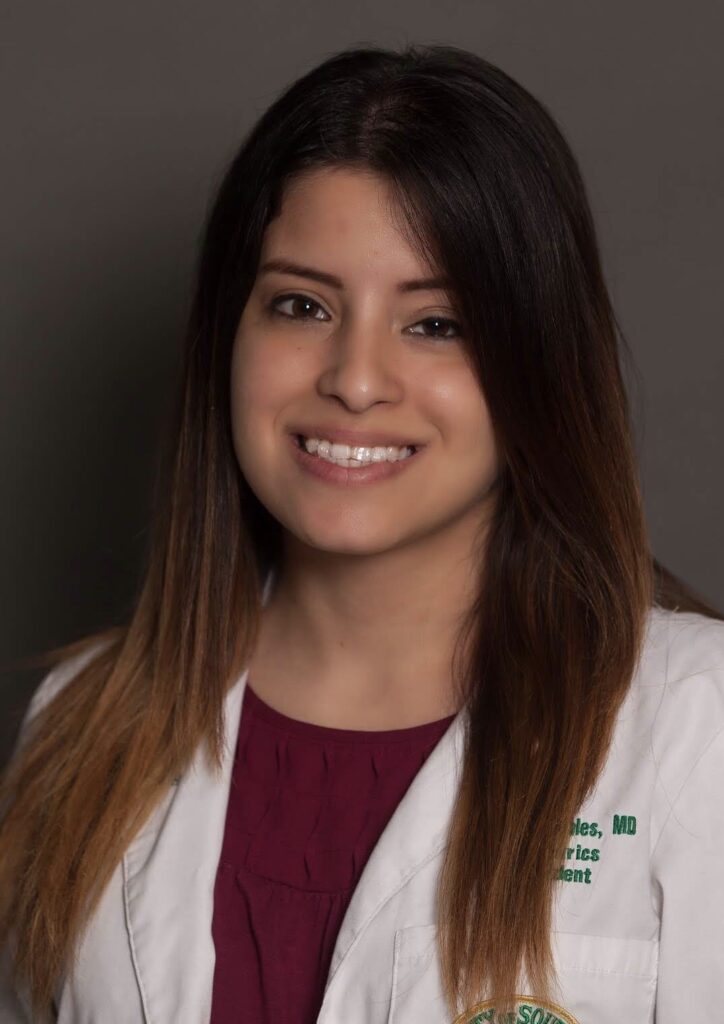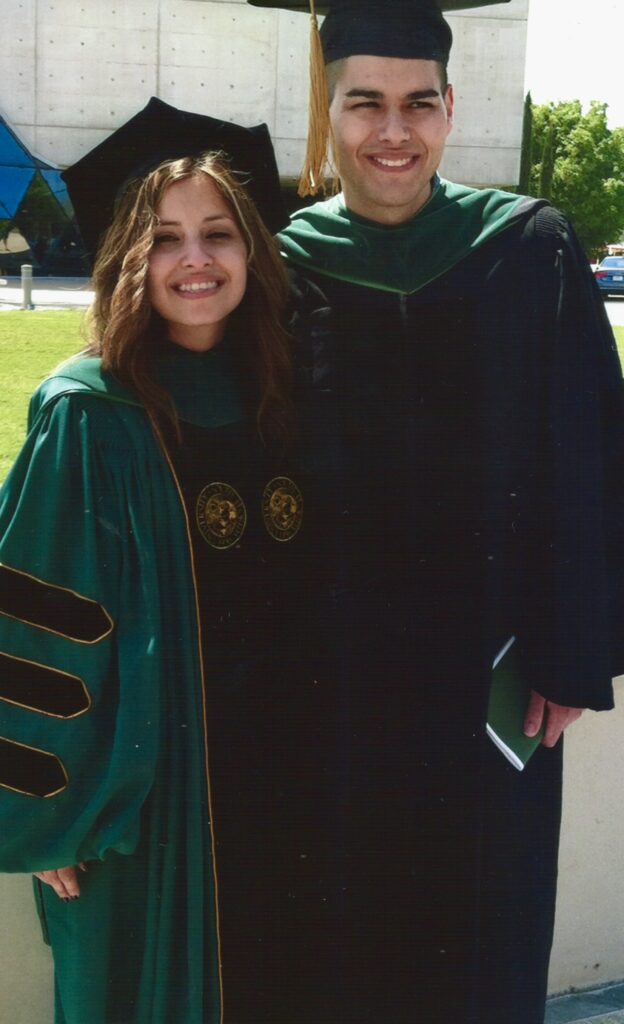
Choose Your Language:
Posted by: The Sumaira Foundation in NMO, Patient, Voices of NMO

It is a skill we learn early in medical school and it is designed to guide the clinician on considering the possible underlying causes of a patient’s symptoms. A good differential diagnosis includes possibilities of each category: neurologic, cardiac, hematologic, infectious, etc. We are taught that the best physicians approach a patient’s symptoms by asking questions in the history and searching for physical exam findings that will either support or rule out possibilities on your differential. We are taught that psychiatric causes are always a diagnosis of exclusion and that common things are common. Be careful getting caught up with “the zebras” aka the rare and unlikely diagnoses. While I learned the skill of developing an extensive differential diagnosis in medical school, little did I know that I would find myself becoming one of the zebras we were once warned about…
In the summer of 2020, after 14 years of education and training, I had finally accomplished my dream of becoming a pediatric hematologist oncologist. I accepted a position that I was excited about starting and was ready for this next phase in my life. While this was meant to be a season of happiness, I started to soon feel this sense that something was terribly wrong as I started developing persistent nausea. I remember many mornings walking to my office from the parking garage in the hot summer weather and retching uncontrollably once I got to my office. This persistent nausea continued for a few weeks and was soon followed by several episodes of vomiting per day. I could not find anything that seemed to trigger the nausea/vomiting other than hot showers in which I would find myself retching as I finished showering and then running out vomiting. I would wake up in the morning retching while still in bed and I would often end the day vomiting as well. I continued to work without missing any days because I felt that I could not let my colleagues or my patients down. Meanwhile, I had started developing my own differential diagnosis to consider the possible causes of my persistent nausea/vomiting.
 Pregnancy:
Pregnancy:a common cause of nausea in a young women of child bearing age. Yet, I ended up buying a box of pregnancy tests and each one came back negative. Clearly not the answer.
I had not started any new medications but stopped taking the one medication that I had been taking for 5+ years in case it was contributing.
The episodes were not associated with any headaches or vision changes, weakness, numbness or tingling..
gastroesophageal reflux? I had started myself on famotidine without any relief. Maybe I was constipated? I had started myself on laxatives. Delayed gastric emptying? I did have any great reasons to have delayed gastric emptying.
This had been going on for too long to be infectious?
Thyroid problems can cause all kinds of issues…
Lupus is always on the differential…
After this continued for about a month, I finally decided that I needed to go to a doctor. Like many doctors I know, I had not prioritized my health during training so I did not have a primary care provider and I needed to establish care but the soonest new patient appointment was about 3 weeks later. Because the nausea was worsening in the meantime, I decided to go to an urgent care clinic one Friday evening after work because I wanted basic labs and a prescription for Zofran (medication to relieve nausea). My pregnancy test was again negative and basic labs were normal. I was given my prescription for nausea and told that it was not really clear what was causing my nausea but to get it followed up on by my primary care provider if it persisted.
By the time I had finally gotten to this primary care clinic visit, my nausea and vomiting had worsened to the point I was barely eating and I had lost 10 pounds in the past few weeks. My husband, a neurologist, accompanied me to this visit because he was concerned about the severity of my symptoms. We were reassured that my exam and labs from urgent care were normal so this may just be due to cyclical vomiting. I was prescribed pantoprazole and advised to take Zofran around the clock for 2 weeks. Over the next week, I took the medications as instructed but was miserable; the vomiting was unbearable so I called the office and expressed my concerns. I was referred to gastroenterology at this point who got me in the next day! I had continued to lose weight prior to this visit and the specialist really took the time to listen and validate my concerns. He advised starting with an abdominal ultrasound and upper endoscopy. I was covering the inpatient service the following week so I scheduled these studies for the week after during my previously planned vacation. How I made it through that week on service is beyond me. I was having episodes of intense nausea/vomiting and uncontrollable hiccups that I could not understand but I kept going, refusing to miss a day of work believing that was just what I needed to do and also because I had a fear that maybe this was all in my mind since I was consistently reassured about how well-appearing I was and about my normal labs.
My long-awaited vacation had finally arrived. It was the week of our 6th wedding anniversary but it turned out quite differently than I had expected. On the first day of my vacation, a Saturday, I started to notice a small blurry spot to the left corner of my eye. I did not think much of it as I had a history of migraines with auras in the past and thought that this may have been the start of a strange aura but the spot never went away and I did not develop the headache. On Sunday, the spot seemed to be growing and I finally told my husband. Of course, my husband’s first reaction as a neurologist was that I needed a brain MRI. I had the endoscopy scheduled for the following day so I told him that I wanted to wait for that because we had been waiting on that procedure for the vomiting and I did not want to miss it. At that time, I had no suspicion that my vision changes were related to the persistent vomiting that I had been experiencing. I had my endoscopy the following morning and it was reported to appear normal. When I woke up from anesthesia and we were on the way home, the left corner of my vision seemed to be getting darker. We got home and I went to take a nap and my husband then tells me that we are going to go see one of his previous neurology partners so we drove 40 minutes to the neurology appointment. While at the visit, I realized that I could not see the neurologist’s fingers when he held them to left. He ordered a brain MRI which was somehow miraculously scheduled for the following afternoon. We received the preliminary report that evening that the MRI brain was normal which was a relief! I was told that I may be having a persistent aura and that the vomiting may be due to cyclic vomiting syndrome so I was prescribed amitriptyline.
When I woke up the following morning, I realized that my left eye vision was worsening but I had a normal brain MRI the day prior so I did not know what to think of it. Was this all in my mind? We decided to make an urgent appointment at the eye center. The techs had noticed a relative afferent pupillary defect to my left eye (a finding often seen in optic neuritis) and also took note that my left eye vision was 20/800. I remember the moment that I started panicking as I uncovered my right eye and realized that I was not able to see the “big E” on the visual acuity test. I also started to notice pain with movement of my left eye during this visit. I finally saw the optometrist after all of these special tests and she stated that she was going to refer me to neuro-ophthalmology outpatient. She stated that she did not feel the need to send me to the emergency department because my brain MRI the day prior was normal. My husband was not convinced and asked if she could pull up the images of the MRI. When he was looking through the images, he pointed out to her that there appeared to be enhancement of the left optic nerve (a finding seen in optic neuritis). The optometrist stated that he should discuss his impression at my outpatient neuro-ophthalmology appointment. Thankfully, my husband recognized the urgency if his impression of the MRI was in fact true. He called his previous partner who pulled up the images and spoke with neuro-radiology who addended the report and agreed that there was enhancement of the optic nerve consistent with optic neuritis. We were referred to the emergency department for immediate management of optic neuritis.
Once we were in an emergency department room, the neuro-ophthalmologist came and started to ask me questions about my vomiting symptoms and my vision changes. He then told me that the optic neuritis in the setting of my recent persistent nausea/vomiting was suspicious for neuromyelitis optica (NMO) and he was convinced that I had NMO until proven otherwise. I cried as I received the news in the very same emergency department that I had shared news of a diagnosis of cancer with many of my patients’ families over the past few years. I was hospitalized for high dose steroids and I am so thankful that my vision was restored just a few weeks later and my nausea had also improved. The aquaporin 4 antibodies returned positive and after months of uncertainty, I was finally diagnosed with NMO.
I consider myself blessed that I was able to get to a diagnosis relatively quickly but this experience has forever changed my view of medicine. I have recognized the serious implications of errors in medicine and how difficult the medical system is to navigate. I can appreciate how much more difficult it is for those that are not medically savvy. I am also haunted by the thought of what would have happened if my husband and I were not in medicine and if he had not insisted on viewing the MRI himself. A delay in prompt appropriate recognition and treatment of optic neuritis could have meant permanent vision loss.
As a both a doctor and a patient, I have learned multiple lessons throughout my experience. I have learned to never minimize my health as I cannot care for others if I am not doing well. I have learned to never assume that a patient’s symptoms are secondary to stress. I was consistently asked about stress when I discussed my symptoms and reminded that the onset of symptoms correlated with the start of my new position. I also learned that as a physician, it is important to have the humility to step back when your working diagnosis does not make sense and when the patient is telling you that something is not right; listen to your patient and return to your differential diagnosis for once in a while, you may find that zebras do exist.